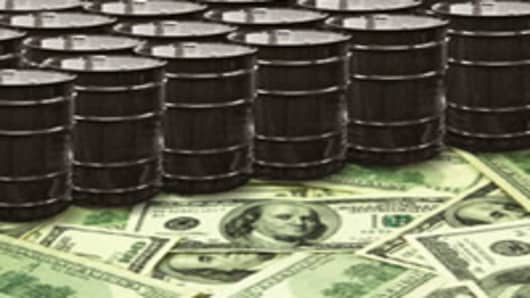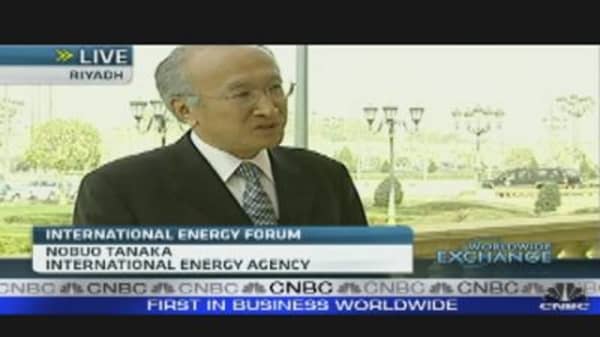With oil prices rising sharply on the back of the crisis in Libya, the head of the International Energy Agency has warned crude prices hitting $100 a barrel could be bad news for economic growth.
"That is our concern, regardless of the margins of disruption, if the $100 per barrel of oil is continued in 2011, the burden of oil to the global economy is as bad as 2008," Nobuo Tanaka, the Executive Director of the International Energy Agency told CNBC on the sidelines of a major oil conference in Riyadh.
Nubuo's comments come amid escalating violence and protests in Libya. In a speech Tuesday, the nations' beseiged leader, Muammar Gaddafi, defied calls to step down, saying he would hold his post and die a martyr if necessary.
Oil traders told Reuters Tuesday that the nation has declared a force majeure on oil exports. U.S. crude prices remained sharply elevated, trading more than 5 percent higher Tuesday.
"2008 we remember is a huge economic crisis year. So … if the oil burden (we calculate by comparing oil expenditure divided by gross domestic product) moves up to 5 percent, it is really serious to the economic recovery," Tanaka added.
"If prices remain at $100 … continuing that level of price is very, very bad to the global economy. Especially to the emerging economies like India, China, Africa, so they have much more serious problem," he explained.
Consumers and importers of oil should focus on using the energy they buy wisely, Tanaka warned.
"The first thing the consumer can do is efficiency, conservation of energy," he said.
Investment should be made in other sources such as non-conventional oils, oil sands or gas, according to Tanaka.
"Gas may have a huge potential in the future, and also renewable, nuclear, everything, we need to use all possible alternatives to reduce the risk on depending too much on oil," he added.
Tanaka agrees with the Saudis that the current price spike is not a supply issue and says there is enough oil to meet global demand even if there were disruptions.
"OPEC for example has a spare capacity of 5 million barrels per day. It is much more than in 2008, the highest stock level of countries is very high. Strategic stockpile per year is 1.6 billion barrels, it sustains for two years at 2 million barrels per day," he said.
OPEC will have to act if supplies are hit, according to Tanaka.
"They have to react if disruption happens...price is moving in many things. Speculation, geopolitical tensions…But if economic growth is happening, and the market is tighter, then disruption happens. Because disruption will create a spike in the price so then OPEC should react," he said.
"If disruption really is happening the situation is getting worse. But don't panic, because we have plenty of oil," Tanaka added.





